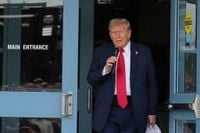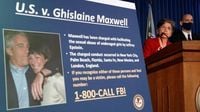On August 22, 2025, the U.S. Justice Department took the unusual step of releasing hundreds of pages of interview transcripts and audio recordings from its recent conversations with Ghislaine Maxwell, the longtime associate of convicted sex offender Jeffrey Epstein. The material, made public in what Deputy Attorney General Todd Blanche called "the interest of transparency," has set off a fresh round of political and public debate, especially regarding former President Donald Trump’s connections to Epstein and the broader handling of the so-called Epstein files.
The interviews, conducted last month in Florida by Blanche—a former personal lawyer to Trump and now the Justice Department’s second-in-command—were intended to address mounting frustration and suspicion among Trump’s supporters. For months, the MAGA base has been vocal in its demands for the release of Epstein-related documents, convinced that hidden evidence implicates powerful figures in politics and entertainment. The Justice Department’s earlier announcement that no further disclosures would be made only intensified these suspicions, with many supporters alleging a cover-up and questioning the administration’s commitment to transparency.
According to the released transcripts, Maxwell, who is currently serving a 20-year sentence for her role in Epstein’s sex trafficking operation, repeatedly defended Trump when pressed about his interactions with Epstein and the young women in their orbit. “I actually never saw the president in any type of massage setting,” Maxwell stated, referencing the coded language prosecutors say Epstein and his associates used to describe sexual encounters with underage girls. She went further, asserting, “I never witnessed the president in any inappropriate setting in any way. The president was never inappropriate with anybody. In the times that I was with him, he was a gentleman in all respects.”
Maxwell’s testimony did not stop at denying any knowledge of Trump’s alleged misconduct. She also offered unsolicited praise for Trump’s political career, saying, “I just want to say that I find – I – I admire his extraordinary achievement in becoming the president now. And I like him, and I’ve always liked him.” When asked about a risqué birthday book prepared for Epstein’s 50th birthday, which was rumored to include contributions from Trump, Maxwell said, “It’s been so long. I want to tell you, but I don’t remember.”
The timing and content of the transcript release have not gone unnoticed by political observers. According to France 24, Blanche emphasized that “except for the names of victims, every word is included. Nothing removed. Nothing hidden,” highlighting the administration’s desire to quell doubts about transparency. The decision for Blanche himself to conduct the interviews—a highly unusual move for a Justice Department official of his rank—underscored the urgency with which the Trump administration sought to regain narrative control amid growing unrest in its base.
Maxwell’s statements, however, are not without controversy. She was convicted in 2021 for recruiting and grooming minors for Epstein’s abuse and is widely regarded by prosecutors as a “serial liar.” Perjury charges were originally brought against her, though they were dropped after her conviction. Notably, Maxwell chose not to testify during her own trial. Some critics, including U.S. Representative Robert Garcia, the ranking Democrat on the House Oversight Committee, have questioned the credibility and motivations behind her testimony. Garcia stated, “Ghislaine Maxwell is a convicted sex trafficker and known liar. Her interview with Trump’s DOJ lawyer shows she’s desperate for a pardon. She claims no involvement in wrongdoing, which is insulting to the girls and young women she victimized and trafficked. She cannot be trusted.”
Adding to the intrigue, Maxwell was recently transferred from a Florida prison to a lower-security facility in Texas—a move that typically would not be permitted for sex offenders. No explanation for the transfer has been offered by either Maxwell’s attorneys or the federal Bureau of Prisons, fueling speculation that she may be seeking or receiving preferential treatment. Her lawyer, David Markus, spent weeks before the interview publicly praising Trump and suggesting that clemency could be on the table. Trump himself had previously wished Maxwell well after her arrest and had left open the possibility of a pardon before her conviction.
During the interview, Blanche made it clear that Maxwell had limited immunity for her statements but that no promises were being made in return. “I’m not promising to do anything,” he told her, according to the transcripts. Maxwell also denied prosecutors’ claims that Epstein paid her tens of millions of dollars to secure her silence, insisting that the funds were used for investments and expenses related to Epstein, such as the purchase of a helicopter. “My belief is that that money also contained money that was for a helicopter, for instance, that I never owned and I — was never mine,” she explained.
Maxwell’s interview also addressed persistent conspiracy theories among Trump’s supporters. She said that Epstein did not keep a “client list” and was not involved in blackmailing prominent figures. “He kept a lot to himself and he didn’t like to share,” Maxwell said. “He was not a sharer. Well, at least not with me.” She also denied seeing any sexual abuse by Epstein or implicating any other high-profile individuals in wrongdoing. When asked about Bill Clinton, Andrew Cuomo, and George Soros, Maxwell said she worked with Clinton on philanthropic endeavors and that he used Epstein’s plane for a trip to Africa, but insisted Clinton never visited Epstein’s private island in the US Virgin Islands, where much of the abuse allegedly occurred.
On the matter of Epstein’s death, which has sparked widespread conspiracy theories, Maxwell stated, “I do not believe he died by suicide.” The FBI and Justice Department, however, reiterated in July 2025 that Epstein had committed suicide, did not blackmail any prominent figures, and did not keep a “client list.” These official statements have only served to further inflame suspicions among Trump’s base, who see the lack of further disclosures as evidence of a cover-up.
The political fallout from the transcript release has been swift. Prominent MAGA influencers, including Laura Loomer and Rogan O’Handley (known as DC Draino), have seized on Maxwell’s remarks as vindication for Trump, arguing that if there were evidence of Trump’s wrongdoing, it would have already been leaked by political opponents. On the other side, Democrats and critics of the administration have dismissed Maxwell’s statements as self-serving and unreliable, warning against relying on the word of a convicted trafficker to clear the president’s name.
Meanwhile, a House of Representatives committee has subpoenaed the Epstein files and received a first batch from the Justice Department on the same day the Maxwell transcripts were released, signaling that congressional scrutiny of the case is far from over.
The Justice Department’s release of the Maxwell transcripts has, for now, done little to bridge the deep divides surrounding the Epstein case. Instead, it has provided new ammunition for partisans on both sides, while leaving many questions about influence, transparency, and accountability still hanging in the air.


